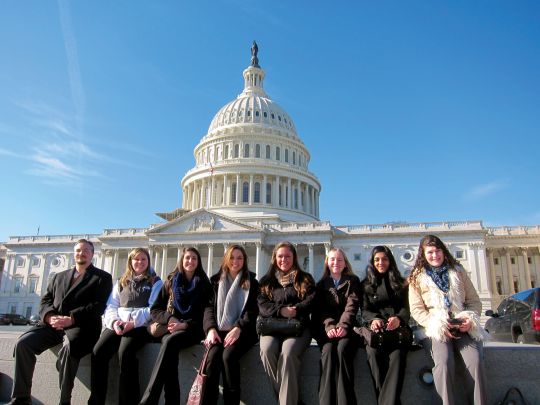
As 17 Cabrini students explored the halls of Congress on Friday, Dec. 2, touring Capitol Hill was far from their minds. Lobbying to sustain the international assistance budget for 2013 was the mission for the ECG 300: Work Global Justice with CRS.
Meeting with 10 members of the Senate and the House was a first-time experience for the majority of these junior and senior students. The trek to Washington, D.C. was a trip the students prepared for all semester by reading literature pertaining to poverty and the importance of development in impoverished countries. Each student lobbied for issues that would be directly affected by the budget cuts, such as orphans and vulnerable children, HIV/AIDS care, education, women’s rights, food and water security and Iraqi refugees.
Cheryl Mrazik, advocacy program officer in the Northeast/Mid-Atlantic Office of Catholic Relief Services, helped throughout the entire process of lobbying. Mrazik started slowly by sharing experiences, speaking of the importance of advocacy, giving tips on how to lobby, offering resources for further information and even role-playing with the students on different scenarios that could occur while meeting with Congress staff members.
“Practicing and having Cheryl [Mrazik] come in gave us a run-through of what was going on, but it was still really nerve-wracking because it was completely new,” Nicole Oulouhojian, junior marketing major, said. “We’d never done that before.”
With Cabrini’s Justice Matters curriculum, working toward the common good is implemented throughout many courses offered and is the educational basis of all ECG courses. Faces of Justice focused heavily on issues affecting many different areas of the world and how to advocate for those who do not have voices to defend themselves.
“It’s interesting because we’re learning about what is going on now rather than just a history class,” Oulouhojian said. “It’s nice to know what is going on around the world; I would never have known about vulnerable children in Africa and been able to speak for them.”
Dr. Jerry Zurek, communication chair and Faces of Justice professor, educated students about policies and the U.S. 2013 fiscal year budget to support their arguments on sustaining poverty-focused international assistance. Moral duties, political motives, national security, economic reasoning and even religion were some of the topics covered when Zurek asked the question: “Why should we care about them?”
“The mission of CRS is to promote human development for the poor and vulnerable overseas and provide opportunities for U.S. Catholics to live their faith in solidarity with their brothers and sisters around the world,” Mrazik said. “Advocacy is the key way to support that dual mission.”
Mrazik stressed that advocacy can help bring awareness to the root causes of poverty. Educating college students on how to make their voices heard and take action will be vital to the future of our world.
“I thought the course was a bit of a curveball when I found out I was going to be lobbying,” Anderson Stahl, junior accounting major, said. “I felt like my experience was semi-productive because when I talked in my first meeting, they agreed with everything I had to say and supported it. Meeting with Jim Gerlach’s staff was more difficult because he was more opposed to my issue.”
Each student had different expectations about how their messages would be received, especially being college students.
“I felt like I expected it to be like them coming at us after every point we brought up and it wasn’t like that at all,” Oulouhojian said. “They were all really nice, they heard what we had to say and they understood what we were talking about. They listened to us.”
Students finished the day by debriefing with CRS legislative specialist, Jill Marie Gerschutz-Bell, learning more about the positions of their members of Congress and reporting back regarding strategies they found successful from their visit. Cabrini has partnered with CRS since 2005 and has worked closely with staff members, particularly educating students and speaking about advocacy and bringing awareness to global issues.
“CRS believes that working in partnership is both true to our Catholic faith and a beneficial, mutually respectful way to promote human development and address issues of global poverty,” Mrazik said.
Approximately 0.6 percent of our nation’s budget is spent on poverty-focused international assistance, a percentage CRS relies greatly on for much of their funding. The people of these developing countries would greatly suffer if the cuts went through and CRS has launched a massive lobbying project.
“Going to lobby shows CRS our commitment to helping them live out their mission,” Danielle DiBartolo, senior social work, psychology, sociology major and president of CRS Ambassador club, said. “It shows that we take the information they give us, absorb it, spread it to others and then advocate legislatively. We represent the future and we are proving to CRS that we are worth the time and resources they put into training us; that we can take their messages to the next level by serving as additional voices in an often underrepresented population.”
Students felt a sense of accomplishment and gratification after discussing the events of their day.
“I felt like I gave Senator Casey a reason to continue what they’re doing by showing my support. They gave us more ways to stay involved and really appreciated what we were doing,” Stahl said.
While students often lobby for school funding and scholarships, Cabrini students are the only ones in the country traveling to the Capitol to lobby for international funding to help the poor and vulnerable.
“I think it’s a good reflection of Cabrini as a whole because it signifies that we practice education of the heart and we are seeking out ways to make a difference,” Stahl said.
“I thought I would probably go to see the sights but I never thought it would be for lobbying,” Oulouhojian said. “I’m glad I went for that reason. It’s a good experience. I can say that I’ve done it and I feel good about it and I’ve learned from it.”


